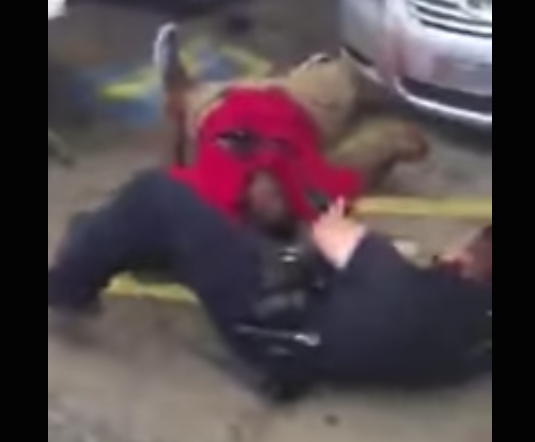When a crime is allegedly committed, an investigation ensues. That’s how it’s supposed to work. And when that crime is of a serious nature, details are of the essence.
Emotion, from an investigator’s point of view, doesn’t matter. Facts matter.
When a police officer shoots and kills someone it’s an incredibly serious issue and of grave concern to all involved. It should be. Those responsible for making a determination about the shooter—the investigators, the prosecutors, the grand jury, and/or the judge—must render judgement based on the facts of the case.
Again, emotions don’t play a part. Or they shouldn’t.
Our Friends in the Media
There are great journalists out there who work doggedly to get the story right. But media corporations aren’t in the business of selling facts. They sell advertising. The more they sell, the better for their owners and shareholders. And there’s no doubt about it: Emotions drive traffic.
Case in point: the Huffington Post.
Yesterday it published a piece entitled, “The 13 Painful Facts About Alton Sterling’s Life (And Death): Alton Sterling was a black man in America.” The article is by Lilly Workneh.
Before I begin addressing the points of the article, let me say this: A man lost his life and it’s tragic. People will suffer for this, including and especially Mr. Sterling’s loved ones. I wish the best for them.
To which I’ll add: I normally refrain from commenting on police shootings at least until some verifiable facts come out. I’m making an exception because of the hateful vitriol that is at a fever pitch over the videos from this shooting. Workneh’s article exemplifies it.
13 Points of Rebuttal
1. Alton Sterling was the father of five children.
She calls the officer a “murderer” and describes Sterling as a “son, a brother and a father of five adorable children.”
I don’t doubt that, but to describe the officer, who also has a family, people he loves, and who love him and didn’t ask to be in that position as a “murderer” is vile in and of itself.
2. Alton Sterling lived in a shelter home and he loved to cook.
The officer, who’s entire life will change because of this incident, has a home and his own interests, came close to dying and not for any other reason than he decided to put on a uniform and do the duty he was sworn to do—protect the public.
3. Alton Sterling sold CDs outside of the same store for years.
He may have, but on this particular day it’s alleged that he threatened someone—scared them enough to call the police. Reports say he made the threat with a gun that was on his person.
4. Alton Sterling didn’t deserve to die.
Workneh admits: “While exact facts about the case are still being clarified, one thing is immediately clear: Sterling didn’t deserve this fate.”
How is that “immediately clear”? I’m not arguing the alternative, I’m just saying it’s about as clear as mud at this point. Bottom line: He refused to obey orders and fought with police. His noncompliance and threatening behavior created this situation.
Another point: To those who say, “You should stand for your rights!” I don’t disagree. Just do it in a way and at a time that doesn’t put you, the police, and the public at risk.
5. Alton Sterling “would have never fought the police.”
We hear this from family members all the time. But on this point there is clarity: He did fight with the police after refusing orders. That’s what the video shows. At what point do the officers act? How many times should they allow reasonable orders be ignored? At what point does Sterling become an immediate threat to public safety and bystanders, like those filming the incident?
6. Alton Sterling was the 558th person to be shot and killed by a police officer this year.
This is a bald lie.
558 people have not been shot and killed by police in 2016. She cites “The Counted,” which is a project by The Guardian that tracks police killings in America. Their list includes anyone who dies after contact with the police, including in custody deaths, being struck by cars in accidents, after Tasers have been deployed, etc. But she says “shot and killed.” Not true.
7. Alton Sterling’s death was caught on camera by a witness who captured what police body cameras likely didn’t.
We now have two videos and her depiction of Sterling being “slammed” to the ground is meant to indict. Here’s something we talk about in most of our seminars: The public hasn’t a clue what real use of force or violence is. We do know this: It ain’t pretty and it’s nothing like what’s seen in movies or on TV shows. It’s ugly. Always has been and will be for the foreseeable future.
8. Alton Sterling allegedly carried a gun for protection.
How do we know that? He was a felon as well as a registered sex offender with a history of domestic violence. Bottom line: If he in fact was carrying a gun, he was breaking Louisiana law given his criminal history.
9. Protesters will not ignore the horrific mistreatment of another black life.
Unfortunately they will ignore the totality of the situation and won’t wait for the facts to come out. And they will focus on the racial component, accusing the officer of racism with no proof of any such ill-will or perspective. They will ignore all evidence that police officers are in fact, as a whole, not racist.
10. We can’t expect Alton Sterling’s killing to lead to a conviction.
Conviction? The facts aren’t yet available, no investigation has been initiated, and no charges filed. Innocent until proven guilty? Does that exist anymore?
11. Alton Sterling’s history will be used in heinous attempts to vilify him and justify his death.
His history is exactly that: His. And it isn’t pretty. It shows a contempt for the legal system, women, children, and laws in general.
12. Alton Sterling’s death is tragically similar to Eric Garner’s.
I think the point that she and others are trying to make is that selling CDs or loose cigarettes are small crimes. They are, in the scheme of things. But again: That’s not what this is about. This is about police officers investigating an alleged threat of violence against the public.
Again: The primary similarity is noncompliance and active resistance.
13. Alton Sterling was a black man in America.
Two things. When you factor in the reality of violent crime, police do not shoot black people disproportionately, which has been documented countless times.
And I agree that black lives matter. Whole-heartedly. Police officers of all races spend their lives in neighborhoods where people of color are being victimized every minute. (And who knows the color of the person who called the police regarding Sterling’s alleged threat?) Police officers of every race put their lives on the line to save those people from being victims.
Conclusion
Let’s try to get together as a people. The default that cops are racists just doesn’t bear out in the stats. Cops know that if they shoot someone, they’re going to go through hell: the hell of living with that memory, the hell of a lengthy and arduous investigation, the hell of public opprobrium, and so on.
We get called upon by the public to keep the people safe and we go places where our high-and-mighty critics wouldn’t dare to go—all in defense of complete strangers and regardless of their race, gender, age, creed, and so on. We’re tired of these mendacious attacks on us.
Every tragedy seems to need an antagonist and a protagonist, clear lines between good and evil. But reality is not so conveniently neat. The immaturity of this latest uproar is beneath us as a nation and does nothing to further the cause of justice.
But it sure gets a lot of hits for the Huffington Post.












0 Comments